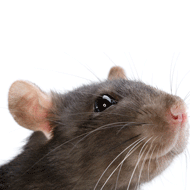Odours ‘can evoke positive emotions’ in rats

"If an animal has to go through a stressful procedure, it could be presented with an odour that it had previously associated with a pleasant context.”
Odours can be used to evoke a positive emotional state in animals, a new study of rats suggests.
An international research team found that rats can learn to associate a neutral odour with a positive experience. Their findings have been published in the journal PLOS ONE.
Rats emit high pitched ultrasonic vocalisations (USVs), which are similar to laughter, when they are happy. This is used to measure their ‘enjoyment’ of being tickled.
Scientists discovered that rats exposed to a neutral odour emitted more USVs when they were subsequently exposed to the same smell without being tickled.
“This suggests that the odour is now able to produce a positive emotional state in the rats and has a number of potential applications, including the use of positive odour conditioning to ameliorate stress in domestic animals,” said Alistair Lawrence, chair of animal behaviour and welfare at Scotland’s Rural College (SRUC) and the University of Edinburgh.
He added: “For example, if an animal has to go through a stressful procedure, it could be presented with an odour that it had previously associated with a pleasant context.”
Two groups of rats were exposed to different neutral odours (A and B). Researchers then measured the USVs produced by the group of rats being tickled and the control group. Tickled rats produced significantly more USVs on the days that they were tickled, and compared to the control rats.
Both groups were then exposed to three odours, an unknown neutral odour, extract of fox faeces, and either odours A or B. Tickled rats emitted more USVs when they were exposed to the odour they had already been exposed to when tickled.
Vincent Bombail, research scientist at the National de la Recherche Agronomique, said: “This is a novel method for positive/appetitive conditioning without the use of drug or food rewards. It is a fascinating foray into the world of positive emotions, which was enjoyable for the rats, as well as all the experimenters involved.”



 The latest
The latest